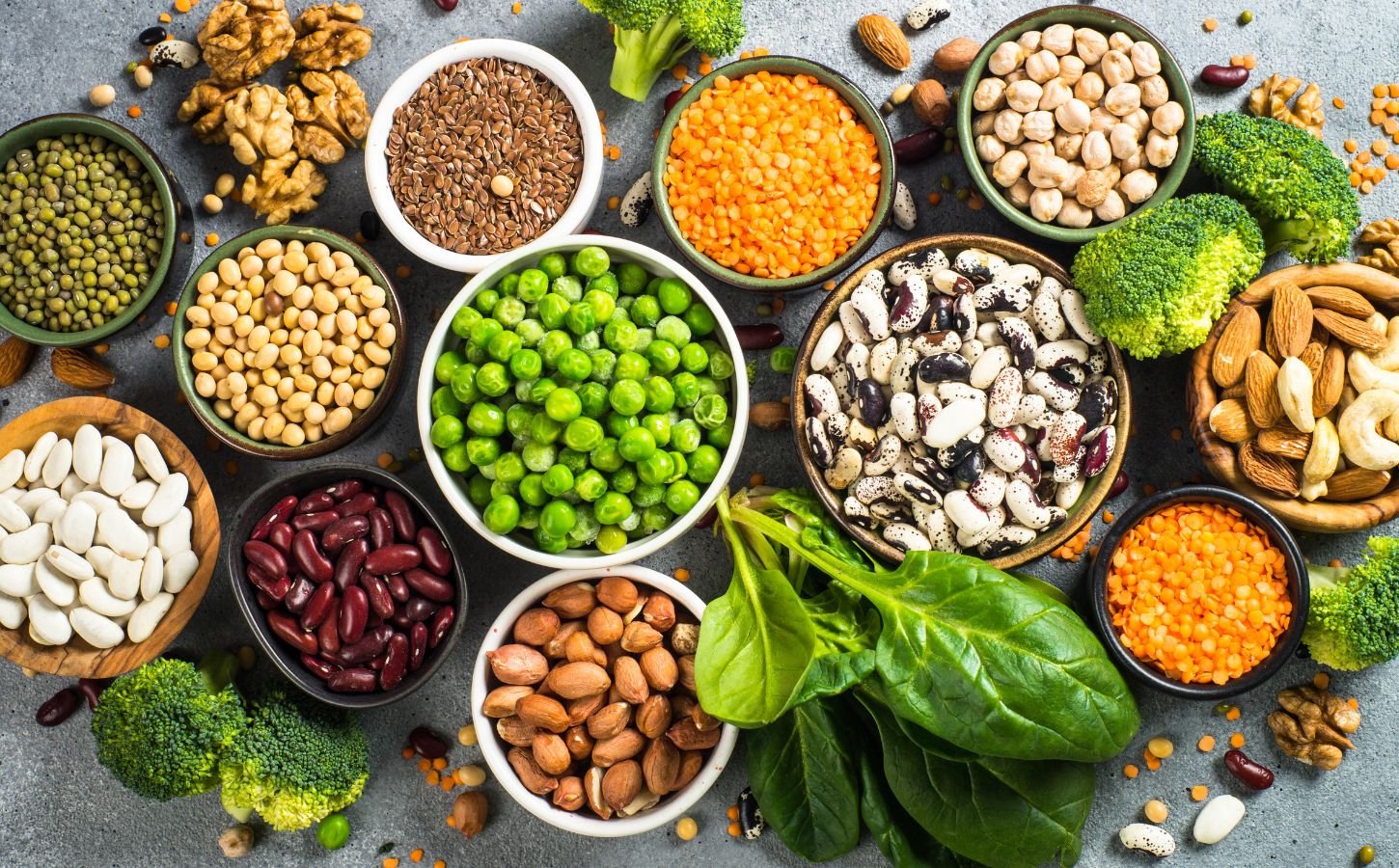All About Healthy And Balanced Food: Advantages of Enjoying Plant Based Alternatives
The discussion surrounding plant-based diets has obtained significant focus over the last few years. Numerous individuals are exploring the possible health and wellness benefits, nutritional advantages, and ecological impacts related to these dietary choices. As individuals come to be much more knowledgeable about their food's impact on well-being and sustainability, concerns arise regarding the usefulness of taking on such a way of living. What specific changes can one anticipate, and how might these choices improve not only personal health yet also the earth's future?
Comprehending Plant-Based Diets
Lots of individuals associate plant-based diet regimens primarily with vegetarianism or veganism, these diets can encompass a broad array of eating patterns that prioritize whole, minimally refined plant foods. Such diets commonly consist of fruits, veggies, whole grains, seeds, vegetables, and nuts, while getting rid of or limiting pet products. This adaptability permits people to customize their nutritional selections according to personal preferences and nutritional demands. Some might adopt a primarily plant-based diet regimen while still periodically consuming meat or dairy, usually referred to as a flexitarian technique. The focus continues to be on including even more plant foods, which can result in a diverse range of meals and tastes. Comprehending these different interpretations of plant-based consuming is essential for valuing its ease of access and charm in modern food culture.
Wellness Benefits of Plant-Based Foods
The health benefits of plant-based foods are considerable, offering a nutrient density advantage that sustains overall wellness. Study indicates that these foods can boost heart wellness and play a vital role in reliable weight management. By including more plant-based options, individuals may enhance their nutritional options and advertise long-lasting health and wellness.
Nutrient Density Benefit
Nutrient density plays an important function in the wellness advantages of plant-based foods, making them an engaging selection for those seeking a well balanced diet plan. Plant-based foods, such as fruits, vegetables, beans, nuts, and entire grains, are commonly abundant in vital vitamins, minerals, and antioxidants while being reduced in calories. This high nutrient density permits people to consume fewer calories while still fulfilling their dietary needs. Additionally, these foods are packed with dietary fiber, promoting digestive health and wellness and helping in weight management. By integrating nutrient-dense plant-based alternatives, consumers can boost their general health, support their body immune systems, and minimize the risk of persistent conditions. Eventually, the nutrient density of plant-based foods underscores their relevance in a health-conscious way of life.
Heart Health Enhancement

Weight Management Assistance
In enhancement to advertising heart health and wellness, a plant-based diet plan can substantially help in weight monitoring. This dietary method highlights whole foods such as fruits, veggies, beans, nuts, and whole grains, which are normally lower in calories and greater in fiber contrasted to animal-based products. The high fiber material helps boost satiety, lowering total calorie consumption. Plant-based diets are usually abundant in essential nutrients while low in undesirable fats, making it simpler to preserve a healthy and balanced weight. Research study shows that people that take on a plant-based way of life tend to have reduced body mass indexes (BMIs) and experience even more effective fat burning compared to those that eat meat-heavy diet regimens. Welcoming plant-based choices is a strategic option for effective weight administration.
Nutritional Value of Plant-Based Active Ingredients
Plant-based ingredients are abundant in crucial nutrients, supplying a varied range of vitamins, minerals, and antioxidants that add to overall health. A comparison of protein sources exposes that while pet products are frequently deemed remarkable, many plant-based choices supply appropriate healthy protein and various other beneficial substances. Understanding the nutritional worth of these ingredients can help people make educated nutritional options.
Crucial Nutrients in Plants
Nutrient-rich components discovered in plants supply a diverse array of crucial nutrients that contribute significantly to general health. These components are abundant in vitamins A, C, and K, which support immune feature, vision, and blood clot, specifically. In addition, plants supply important minerals such as calcium, potassium, and magnesium, essential for heart wellness, muscle feature, and bone stamina. The visibility of fiber in plant-based foods aids digestion and advertises a healthy and balanced gut microbiome. Anti-oxidants, located abundantly in vegetables and fruits, assistance combat oxidative tension and minimize inflammation. In addition, lots of plant foods are low in calories yet high in nutrients, making them an outstanding selection for those seeking to preserve a healthy and balanced weight while making certain suitable nutrient intake.
Comparing Protein Resources
Healthy protein resources vary significantly in their nutritional profiles, with plant-based active ingredients supplying distinct benefits. you can look here Unlike animal healthy proteins, which frequently consist of hydrogenated fats and cholesterol, plant proteins have a tendency to be lower in these unhealthy elements. Legumes, nuts, seeds, and entire grains are abundant in important amino acids, fiber, vitamins, and minerals. Lentils provide high protein web content alongside substantial iron and folate, while quinoa is a complete healthy protein, using all 9 essential amino acids. Furthermore, plant-based healthy proteins are frequently come with by anti-oxidants and phytochemicals that sustain total wellness. The shift to plant-based healthy protein resources not only enhances dietary consumption however likewise lines up with lasting nutritional practices, lowering environmental influence and advertising long-lasting wellness advantages.
Ecological Effect of Plant-Based Eating
As understanding of climate modification grows, several individuals are discovering lasting nutritional choices that can considerably decrease their environmental footprint. Plant-based consuming has arised as a considerable factor to decreasing greenhouse gas exhausts, which are mainly linked with animals manufacturing. The farming of fruits, vegetables, grains, and vegetables usually needs fewer sources, such as water and land, compared to pet farming. Furthermore, plant-based diet plans can result in decreased deforestation, as much less land is required for grazing animals or growing animal feed. By shifting in the direction of plant-based options, customers can sustain biodiversity and advertise much healthier ecosystems. On the whole, accepting plant-based consuming not just advantages individual health but additionally stands for an important step towards ecological sustainability and preservation initiatives.
Overcoming Common Misconceptions
While lots of people identify the advantages of a plant-based diet plan, several misunderstandings usually prevent them from completely accepting this lifestyle. An usual idea is that plant-based diet plans do not have adequate healthy protein; nonetheless, many plant resources, such as vegetables, nuts, and tofu, give sufficient protein. In addition, some assume that this diet regimen is costly, when in fact, staples like beans, rice, and seasonal veggies can be quite affordable. One more mistaken belief is that plant-based consuming is overly restrictive, whereas it in fact offers a diverse array of foods and tastes. Many stress that a plant-based diet may lead to deficiencies, yet with proper planning, people can obtain all needed nutrients, including vitamins and minerals, while appreciating a large variety of scrumptious dishes.
Tips for Transitioning to a Plant-Based Lifestyle
Making the change to a plant-based way of living can be an enhancing experience, though it typically calls for some guidance to navigate the first changes. Initially, individuals are encouraged to start slowly, integrating even more fruits, vegetables, beans, and entire grains right into their dishes while decreasing meat and dairy consumption. Meal preparation is essential; preparing an once a week menu can help ease the modification and stop final unhealthy options. Discovering new dishes and cooking methods can also maintain and improve look here the experience excitement about plant-based eating. In addition, joining support system or areas can provide inspiration and share valuable suggestions. Lastly, remaining informed regarding nutrition guarantees well balanced meals, avoiding deficiencies while promoting a healthy and balanced, gratifying plant-based lifestyle.
Delicious Plant-Based Meal Concepts
Checking out delicious plant-based meal ideas can influence people to embrace a more nourishing diet. One popular alternative is a hearty quinoa salad, featuring cherry tomatoes, cucumber, and a zesty lemon-tahini dressing. An additional favorite is a tasty lentil stew, packed with carrots, celery, and great smelling herbs, best for a soothing dinner. For morning meal, over night oats made with almond milk, chia seeds, and covered with fresh berries give a nutritious begin to the day. Additionally, a vibrant veggie stir-fry with tofu and a variety of vibrant veggies can be a fast yet satisfying meal. Creamy avocado salute on whole-grain bread, sprinkled with seeds and flavors, uses a basic yet delicious treat. These meals showcase the selection and richness of plant-based eating.

Often Asked Concerns
Can a Plant-Based Diet Offer Enough Protein?
The concern of whether a plant-based diet regimen can give enough healthy protein is usual. Numerous sources, consisting of vegetables, nuts, seeds, and whole grains, can fulfill protein requires effectively, supporting a balanced and healthy diet regimen for individuals.
Are Plant-Based Diets Appropriate for Kid?
The viability of plant-based diets for kids depends on mindful preparation. Appropriate nutrients need to be ensured, including vitamins, minerals, and healthy proteins. With appropriate assistance, such diet regimens can sustain healthy development and development in children.
Exactly how Do I Dine Out on a Plant-Based Diet regimen?
Dining out on a plant-based diet regimen entails looking for restaurants with varied food selections, requesting for adjustments, and checking out vegan-friendly options. Preparation ahead and communicating nutritional choices can boost the eating experience while preserving dietary selections.
What Prevail Irritants in Plant-Based Foods?
Typical irritants in plant-based foods include soy, gluten, nuts, and seeds - Gluten Free BBQ Sauce. Individuals following a plant-based diet regimen should know these irritants and check out labels carefully to prevent adverse reactions and assure risk-free consumption
Can Plant-Based Diets Aid With Fat Burning?
Study indicates that adopting a plant-based diet regimen may facilitate weight management as a result of its typically lower calorie thickness and more higher fiber web content. This mix can boost satiety, aiding individuals manage their caloric intake efficiently. Several people connect plant-based diets mainly with vegetarianism or veganism, these diets can include a broad array of consuming patterns that focus on whole, minimally refined plant foods. Nutrient thickness plays an essential duty in the health advantages of plant-based foods, making them a compelling choice for those looking for a well balanced diet plan. Plant-based diet plans have actually been revealed to substantially enhance heart health and wellness, as they usually include elements that sustain cardiovascular function. In addition to promoting heart health, a plant-based diet can significantly assist in weight monitoring. A common idea is that plant-based diet plans do not have enough protein; nevertheless, various plant resources, such as beans, nuts, and tofu, provide adequate protein.